Welcome back after a week off! This week’s episode dives right in, so I will too. Joan meets Detective Bell to investigate the murder scene of a lawyer named Gilbert Pham. He’s been dead in his home two days. It looks like someone broke into the house and tossed it, but to Joan thinks the “home invasion” was just done for show. Pham was handcuffed to a chair in front of his computer for at least an hour or two before the murder. So what was on his computer?
Sherlock doesn’t show up to the crime scene. He and his father are continuing their conversation from the previous episode. You know, the one about how Moriarty might be back! Morland wants his help…to kill Moriarty before she kills him.
But Sherlock is suspicious of the whole thing and doubts she’s really back. He calls on his contacts in the British intelligence community to get his hands on the personal belongings of the assassin that died in the previous episode. He was supposedly working for Moriarty. There might be some clues in there.
That out of the way, Sherlock joins Joan and Bell. The three interrupt a corporate party celebrating a merger between two tobacco companies, Summit-Stow Distributors and Washburn Tobacco. It was Pham’s job to vet the financials of Summit-Stow, but with his approval, the merger was going forward at last. But Pham’s approval was sent during the time period he was handcuffed to the chair. Possibly literally with a gun to his head. That puts a damper on the party.
Washburn Tobacco is a big cigarette company and Summit-Stow a smaller tobacco wholesaler. If they were to merge with Washburn, that’d be big money for the Summit-Stow executives. Since Pham was hired in the first place by Washburn, the detectives suspect that the Summit-Stow execs have the most motive to kill Pham. Maybe he found something off in the financials. Then one of the execs forced him to approve the merger and killed him.
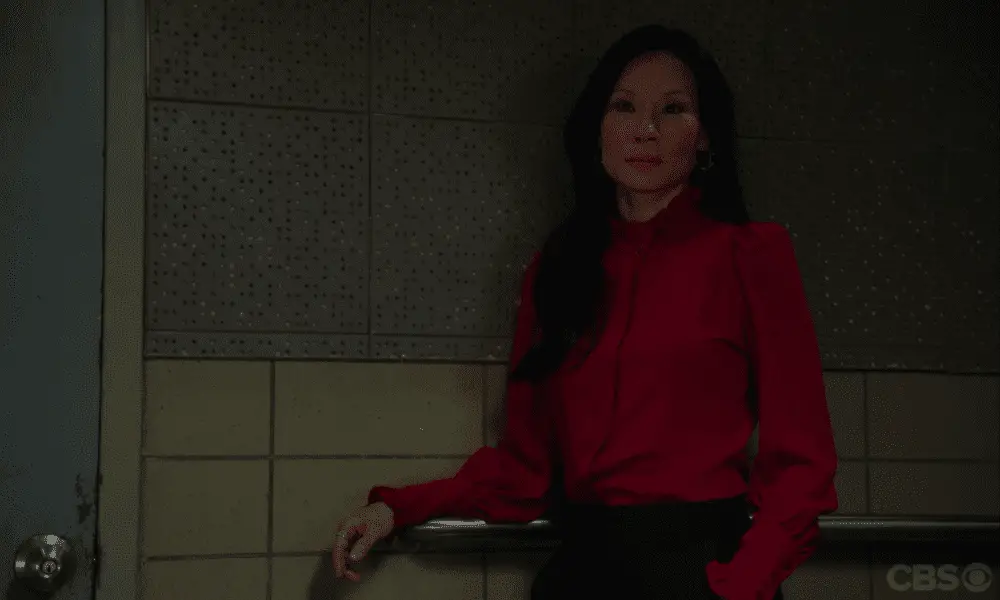
Summit-Stow’s president, Kip Lowell, immediately stands out, considering his nervous and distracted attitude. Oddly, he defers to a mere sales manager, a man named Darsha. But Lowell, Darsha, and the other executives were all out of town on the night of Lowell’s death.
Major Crimes’ tech experts find Pham’s work documents on his computer. There’s nothing wrong in the financials, but Pham had focused in on Summit-Stow’s warehouse. The records show that the company was bringing in and shipping out more cargo than the financials account for.
Hey, ready to learn about another kind of weird crime that you’ve never heard of before but is totally real? Interstate cigarette smuggling! Due to tax differentials across state borders, cigarette smuggling is a lucrative business. Summit-Stow is based in Ohio and Ohioan cigarettes have been showing up in local New York bodegas. So, the alibis of the Summit-Stow execs all check out, but maybe one of the smugglers working with the company killed Pham.
Joan sniffs one of the smuggled cigarettes and has an idea. She brings in one of Sherlock’s Irregulars, the man known only as the Nose. Joan hopes his super sniffer can detect something to help track down the smugglers. Sherlock is a little miffed. Apparently he and the Nose have an ongoing schism on the topic of tobacco, because of course they do.
Away from the Nose for a moment, Sherlock finally tells Joan the news about Moriarty’s potential return. Among the assassin’s belongings Sherlock found clues leading to the man’s hideout. At the hideout were plans for killing Morland, as well as several bags of – wait for it – coffee beans. Not exactly typical assassin stuff. The beans were purchased from a local cafe that Sherlock plans to investigate soon. Joan asks him if he’d really be willing to help his father kill Moriarty. But before he can respond, the Nose interrupts.
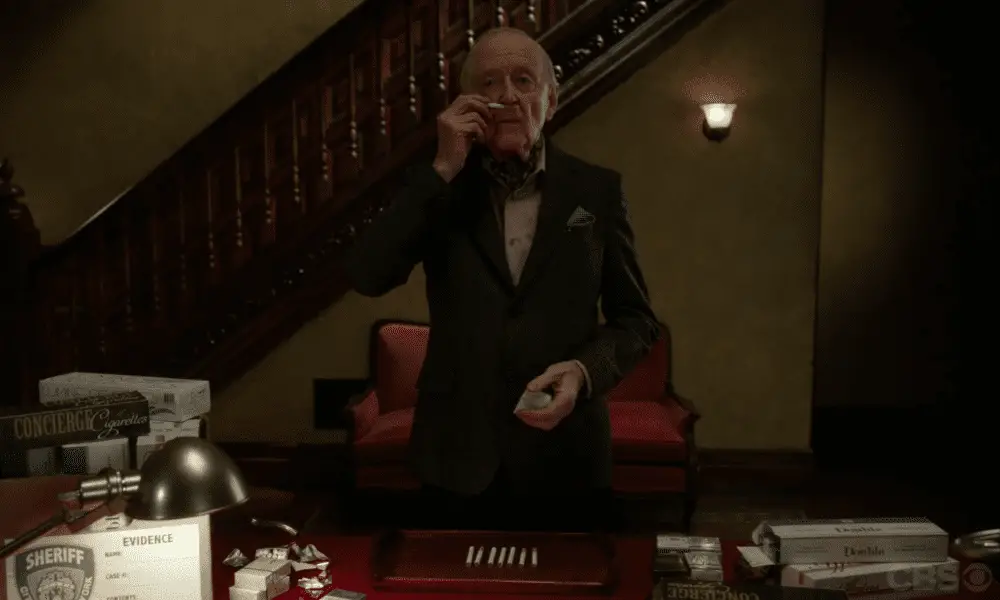
There’s an interesting scent on the smuggled cigarettes. Hops, like the kind used to brew beer. The cigarettes and hops must have been transported together. There’s a craft brewery in the area where the cigarettes are being sold.
Sure enough, when Bell stakes out the brewery, he finds contraband being moved in and out. But just as he’s about to move on the smugglers, he gets a call from Gregson telling him to stop. Darsha, the mysterious Summit-Stow executive, is in Gregson’s office. Except Darsha isn’t his real name and he’s not really a sales manager.
He’s an ATF agent named Bakshi. The brewery smugglers are just a small part of a huge smuggling ring that he and his partner, Evaneer, have been trying to take down for years now. The agents have been running an operation out of Summit-Stow. The discrepancies Pham found weren’t the result of real smuggling. It was actually the ATF using the company as a cover to run stings. Lowell knew of their presence. But the ATF agents say they had no reason to either force the merger or try to prevent it. They didn’t even think that Washburn would have noticed their presence. Besides, even if Pham had spelled the end of their sting, they would have just left and set up elsewhere, not tried to kill to protect the operation. But that doesn’t mean Lowell would have felt the same.
So the detectives are off to question Lowell next. He’d allowed the ATF to do their work within his company because they had proof that Summit-Stow was already selling to smugglers. The ATF kept that info on the downlow in exchange for help. But when Phan had uncovered the suspicious activity in the warehouse, Lowell told Phan the truth and had his office manager send him tapes of Bakshi and Evaneer’s work as proof. If Lowell told Phan the truth already, why kill him? After all, Lowell wasn’t actually doing anything illegal (now).
Lowell also shares the security footage with the detectives and Bell notices something odd. Evaneer and Bakshi are both driving fancy and expensive cars. They also sport some designer fashion. How are they affording that on government salaries? And where did all the money from their stings go? Maybe it’s time to talk to the agents again.
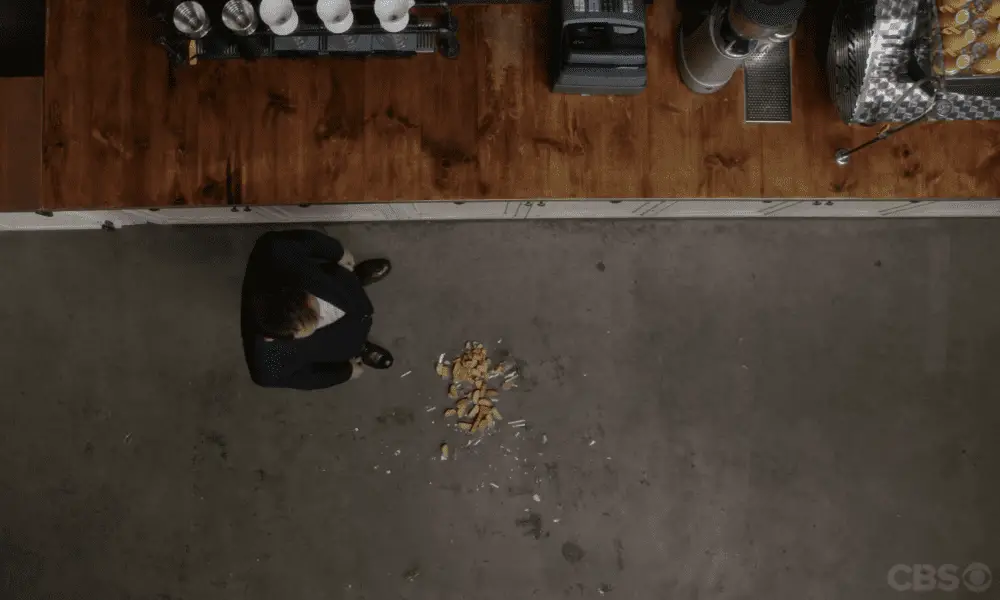
As they track Bakshi and Evaneer down, Sherlock checks out the assassin’s cafe link. It looks like a normal coffee shop, except for one thing. On the wall is a strange painting. Sherlock knows instantly it is one of Moriarty’s works. He knocks a glass jar on the floor, looks into the security camera, and tells the coffee shop cashier to tell the cafe owner to get in contact with him. I know that all sounds cryptic, but as a person who has worked in a cafe, honestly, customers are just like that.
Later, Sherlock and Joan further inspect the Summit-Stow security footage. Joan has done the math and thinks that the two agents could have made tens of millions in their smuggling work. The money is definitely not with the government; Bakshi and Evaneer are supposed to turn all the money in at the end of their operation. In the meanwhile, the money is totally unsupervised. Naturally, the two have skimmed off the top and made their own personal slush fund. But if Pham was investigating the Summit-Stow smuggling, he very well may have uncovered the slush fund too. But big surprise, the two agents have gone missing.
Joan asks again if Sherlock could bring himself to kill Moriarty. He answers honestly that he doesn’t know. Joan suggests stepping aside and letting his father and Moriarty go at each other and whatever happens, happens. But Sherlock worries about the potential for collateral damage.
One of Bell’s primary duties on this show is to interrupt Serious Conversations with phone calls, so he, you know, does that. They’ve found Bakshi and Evaneer. Both dead. A witness heard them shouting, “I didn’t do it!” at each other and then gunshots. They killed each other in a shootout. As to what it was they didn’t do, there’s a notification on Evaneer’s phone that someone withdrew millions from the slush fund. So did one of them secretly do it and lie, or were they telling the truth? Is there a third party?
Bell is of the opinion that it was someone else. Both Bakshi and Evaneer had alibis for Pham’s death, so even though they had motive to want him dead, someone else must have done it. Plus, when they go over the account information for the slush fund, they discover that as well as the one big transfer, there are several similar, smaller transfers out of the fund, all to the same account in the Cayman’s. The third party has been stealing from the stolen money. Meta-stealing, if you will. The detectives wonder if Pham also uncovered this. Man, how many crimes are we on now in this episode? And poor Pham had the bad luck to uncover it all.
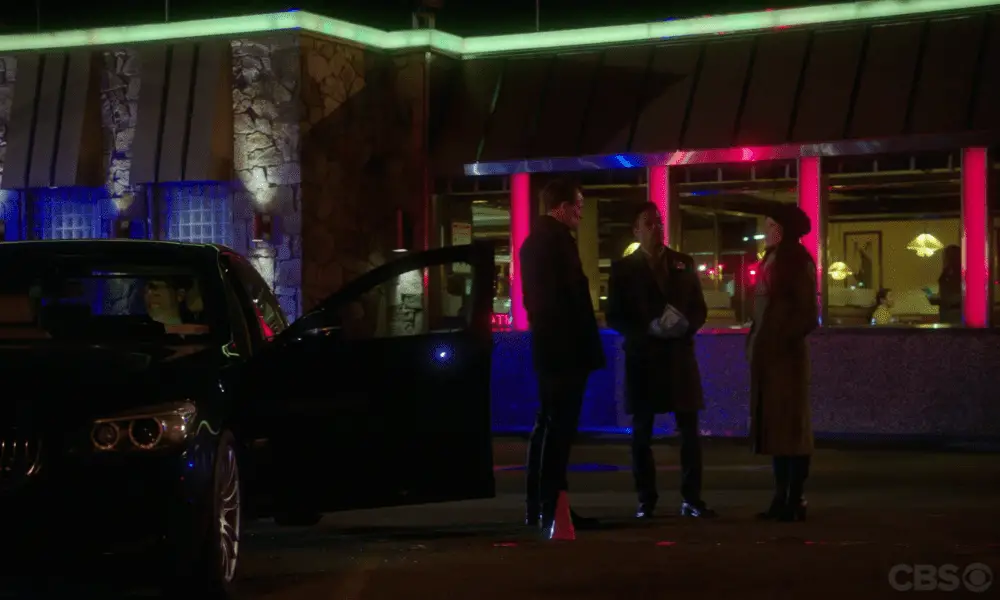
There’s something else odd in the slush fund. There have also been transfers to cities across the nation, and each city had its own ATF field office. What’s up with that? When they check Bakshi and Evaneer’s phone records, they find each transfer came after a call from another ATF agent, so they bring him in for questioning. He has an odd but simple explanation for it.
The ATF did know about Bakshi and Evaneer’s slush fund, although not that they were padding their own pockets with it. Instead, they were supposed to be using it to secretly fund ATF operations. This is an illegal process, but the ATF justified it with the explanation that they were using the money to catch bad guys. The agent has one further helpful piece of information. Bakshi and Evaneer did have an accomplice, a person they called “the Bulldog.” That means something to Joan. She knows who the killer is.
But the why is still a little foggy, as is how the police can catch this person, who has vanished. Joan works on that as Sherlock waits for Moriarty to contact him. It doesn’t take too long. But it’s not Moriarty herself; it’s the woman from the coffee shop, named Ellory. Sherlock reveals that his father is planning to kill Moriarty. But he’s more interested in discussing his father’s death. Gasp!
Joan investigates more into the ATF agents and their slush fund. Although the ATF agents clearly thought of themselves as the good guys, their arrest rates actually dropped after receiving money from the fund. That, at last, gives Joan the clue on why the killer took out Pham, how she escaped, and how to catch her.
The episode ends with a scene of Sherlock and his father meeting again. Sherlock at last reveals his plan to deal with Moriarty, at least for now. He made a truce with her, a cease-fire. If she kills Morland, then Sherlock will step up and take over her organization, and thus far, she’s been unwilling to hurt Sherlock himself. Same thing stands if Morland moves on Moriarty. Of course, once Morland dies of natural causes, Moriarty will still be out there and still dangerous, and Sherlock will no longer have his father for help. But that’s what Sherlock wants. He’ll deal with his problem himself.
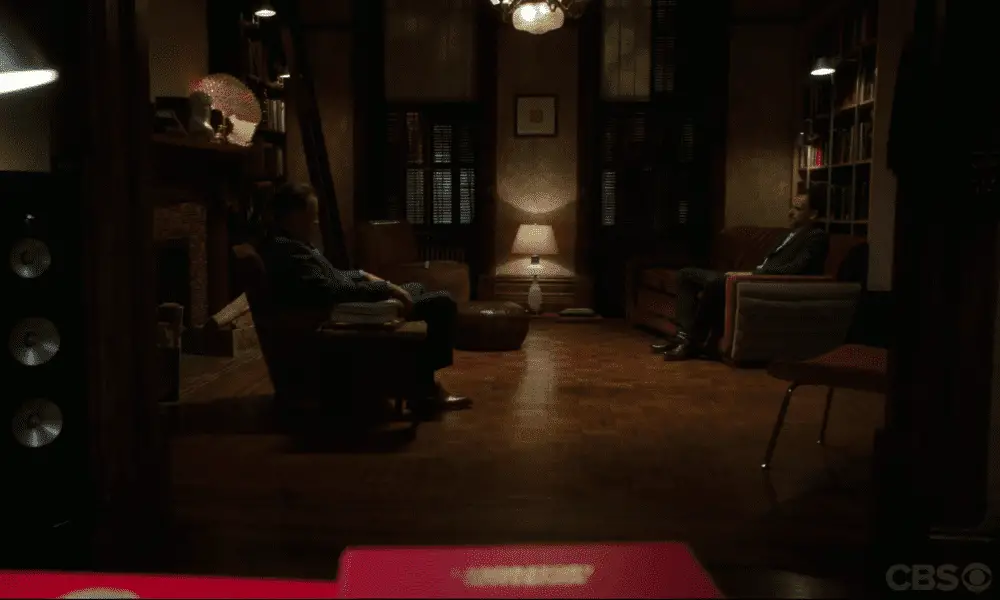
Thoughts:
- I think that we as consumers of fiction tend to think that if the conclusion of a story, especially a murder mystery, isn’t surprising, then it isn’t well written. I disagree. A little surprise is good, but sometimes if it’s too surprising, that’s because the the writers haven’t set the stage and given you clues along the way. In this episode, they definitely surprised me, because it kind of came out of nowhere. The story was otherwise intriguing, but I think they could have given you more hints as to who-done-it along the way.
- The various threads of criminal activity and meta-crime in this episode made sense as I was watching along, but man it was confusing to try and describe it.
- I’m disappointed but not surprised that Moriarty herself was not in this episode. Natalie Dormer is a bit of a big shot these days!
- I wish the cafe I worked at was secretly a front for a crime organization ran by a beautiful and glamorous mastermind.
- Why do I recognize Kip Lowell?
- The title this week is “You’ve Come a Long Way, Baby” and I don’t…get it…
Images courtesy of CBS

